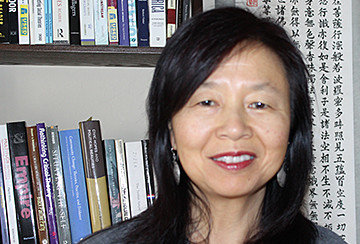Mimi Kim
Generation: Second GenerationLocation: Oakland, CA (at time of interview)
Interviewer: Ramsay Liem
War Legacies
Being second generation, not having other family members here besides my immediate family to really fill in a lot of the stories, so you just really pay attention to the very small things that your parents say once in a while. I thought it would be interesting to have a group come together to talk about the North. My father’s from North Korea. How does that particular experience affect us because I really have a lot of friends that have at least one parent who was from North Korea? So I thought, “Are we attracted to each other somehow?” But we’re not really talking about this and well, your family’s the same, right? It seemed to be, I know for me, a really significant part of who I am because it’s such a significant part of who my father is.
Pre-War Period
Family Separation
One of the most significant things that impacts his [father’s] life is his leaving North Korea at age eighteen. It was before the war. He was born in 1927…. It was right after the Russians marched into North Korea and since his family was [upper] class, you know, they lost everything and he wanted, he felt like he had to leave. His older brother had left first so then he followed after. [But not everyone left.] And he only recently got reunified with his family. He had a chance to go three times, and he just went the last time, he went last year. So he found—well, he had heard that his father had died fairly soon after he left, and you know, he blames the whole Communist takeover for that. And then he went back, and all his siblings were still living with his mother though she died earlier this year.
Life in the United States
And then on my father’s side, I got together with my cousins and I just remember there’s one cousin who’s the oldest son of the oldest son—my dad’s brother who was oldest. My dad’s the second [oldest] and then the oldest son is kind of the head of the family over there [Korea]. We can’t speak a lot because his English is pretty limited but we were really struggling and we were trying and I just remember him making the comment that he felt like he was sleepwalking because he had never seen North Korea, he’d never seen what he considers his home…. And that really struck me because I thought, you know, he’s in Korea. But still he felt that way because somebody in South Korea [can’t visit the North]. And, you know, just that image of sleepwalking was so….
Korean War Memories
She [my mother] didn’t talk. Well, I think she’ll talk less about her whole Korea experience just in general. She definitely wants to forget Korea, a lot of her experience in Korea. I think it was her, her family. Um, just a couple things about, I guess being under Japanese occupation, but also I remember her even just saying that she was part of one of the Communist demonstrations. “I was there, I was at a Communist demonstration.” But I think she just thought that it was kind of funny. But obviously, she was involved in some way, to even have been at that demonstration. But, she’s not really talking about that.
Postwar Period
Yeah, he was involved in the church. He was playing the organ in the church and, and that’s how he got the opportunity to come over. So then he took the opportunity. And I know there were all sorts of [complications on] my mother’s side. My mother’s father particularly hated my dad because he was from North Korea and they’re from the south. So, there was all sort of conflict involved and I think at one time my mom said that, when he actually left to come to the U.S., he said he was coming to, you know, have a better life for their family, our family. And I think her dad was, “See, he’s going to leave you.”
War Legacies
But you know, on a political level, I just think that, so much of um, well, for one thing, this whole refugee experience is so much, like, it’s having such a huge impact. So many people are refugees and [are] going to be children of refugees—so many people in the U.S. I just think that there’s so much denial of that. And also I think this whole Asian immigration experience is, like, this whole model minority idea that people all came over for better, you know, opportunities. I mean, I just think Asian Americans are buying into that and that is really bothering me…. I mean are we even talking about the Vietnam War? Do you remember why people, Southeast Asians, are here? And um, Koreans. I mean I consider myself here because of the Korean War.

